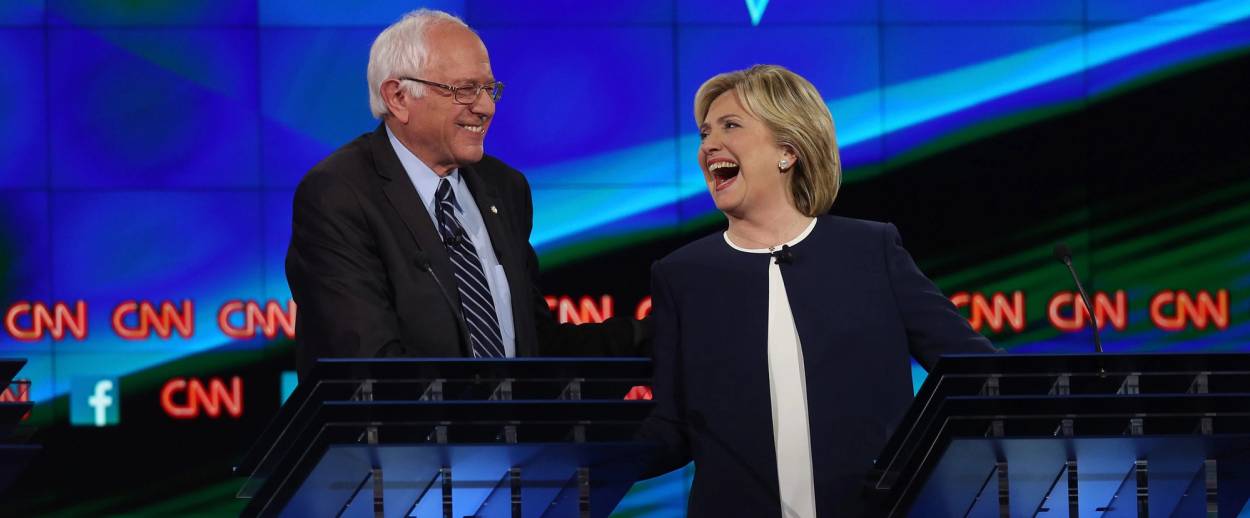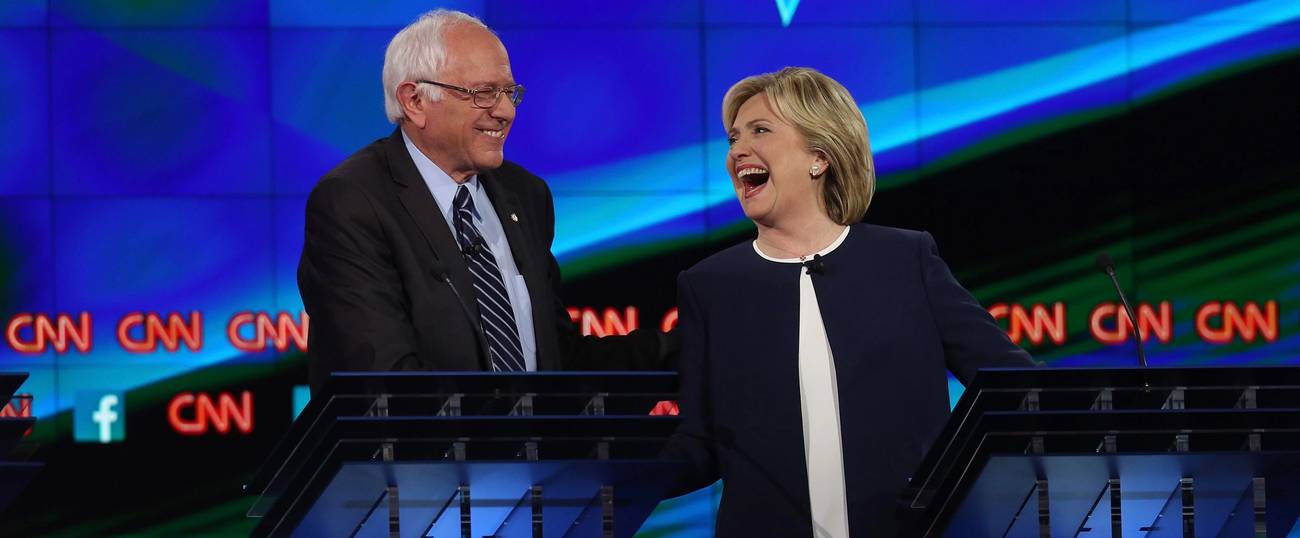Bernie and the Socialist Virtues
What Sanders’ Harringtonian eloquence brings to the American left




The best part of the Democratic debate, apart from Bernie’s defense of Hillary on the emails, was Bernie’s defense of democratic socialism. He made three excellent points, which rolled off his lips with marvelous ease. To wit: A) Democratic socialism is a doctrine that observes the disparities of wealth in the United States and regards them as immoral. And B) Democratic socialism is a practical doctrine, as shown by the social programs and policies that you can see in countries like Denmark, Sweden, and Norway. And C) —only, here came an interruption. Before Bernie could say more, Hillary threw in an objection. She said that capitalism allows small businesses to get started. This amounted to a defense of capitalism. And she added that we are not Denmark—though she was nice about it and said, “I love Denmark.” But Bernie responded by saying—here was point C)—that we in the United States are a great entrepreneurial nation and that small and medium-sized businesses are the backbone of our economy, which means that, from a democratic socialist viewpoint, entrepreneurship is good. And yet, there is a problem with the billionaire class and the grotesqueries of inequality.
These three points offer a capable summation of what socialism has to offer to America’s political understanding. Point A, regarding the moral condemnation of inequalities of wealth, does not propose a program of action, but it does offer an ethical orientation. By insisting on the ethics of the matter, this point prevents the question of extreme inequality from disappearing into the abyss of a thousand other issues and controversies, as would otherwise be bound to happen. Point B, regarding the Scandinavian examples, offers an internationalist perspective. It reminds us that we are foolish to suppose that American experience contains the whole of wisdom—reminds us that other countries may well do certain things better than we do. And Point B does offer a program of action. It tells us that, if we want to do something about a variety of social problems, we do not have to throw up our hands in despair. The programmatic models exist.
Point C, regarding the importance of small and medium businesses, reminds us that a program for economic equality can also be a program for economic productivity—if only the economic system can be properly designed. And economic systems can, in fact, be properly designed, as shown by Point B and the various exemplary models around the world, not all of which, by the way, consist of tiny Scandinavian republics.
Bernie has done something heroic in making these points. There is something parched about American political debate—something resistant to the imagination and maybe to the moral sense, which renders us incapable of dealing with obvious problems of American society. The parched quality has a name. It is the prejudice against the word “socialism.” The word is declared taboo. Conservatives and communists agree in saying that socialism is the same as communism. But socialism is not the same. If only we would allow ourselves to speak of socialism, in Bernie’s version of it, we would discover that it is permissible to glance at what the European social democrats or even the Canadian conservatives have done over the decades. We would discover that we, too, can enact social and economic programs designed to bring about large and democratic transformations. And here was Bernie at the debate to make these arguments, explicitly and implicitly, and it is wonderful, even if the commentators are still puzzling over the left-wing vocabulary.
***
On foreign policy, I never expected to agree with Bernie, but, I must say, neither has he dismayed me. There has been for a long time a left that I think of as psychopathic—a left that hates itself, and hates America, and hates Americans, and generally is in the business of self-flagellation. Jeremy Corbyn, who has just been elected leader of the British Labour Party, is the representative of this kind of left in its British version—except that Corbyn appears to have it in for America, too, as is always the case. Corbyn, in regard to foreign policy, aspires to transform Great Britain into a kind of Iceland, without the slightest influence around the world, except for an instinctive support for dictators here and there. But Bernie Sanders is not a Jeremy Corbyn.
Bernie voted in favor of American participation in the Kosovo War, which was a humanitarian intervention; and he voted in favor of the invasion of Afghanistan, in order to retaliate against Bin Laden. Here is a leftist who understands that American power can be turned to noble purposes and who understands, too, that America has an obligation to defend herself. At the debate, the question of Israel did not come up, but it is worth mentioning that Bernie’s leftism is not anti-Zionist, either—another point on which he differs from Corbyn, the friend of Hamas and Hezbollah.
There is something parched about American political debate. The parched quality has a name. It is the prejudice against the word socialism.
In the debate and during the campaign Bernie has emphasized that, in regard to Iraq, he was and remains stoutly antiwar and has held this position ever since the congressional vote, in 1990, on the first of the Iraq wars. At the debate he described the Iraq War of George W. Bush as the worst foreign-policy blunder in American history, which is a little excessive. (Surely the American decision to disarm and become isolationist after World War I was the worst such blunder; and the Vietnam War was not a small mistake.) But no one disputes that America blundered in Iraq. He has argued that a different sort of policy against Saddam could have been followed, beginning with the first Iraq war, and this is doubtless true. So, I find his positions respectable. But he does not convince me that he is the man to come up with alternative policies. At the debate he came out against any attempt by the United States to impose a no-fly zone in Syria, on the ground that American military efforts might bump up against the Russians. But, as Hillary observed, American planes are already flying over Syria as part of a military campaign. His remarks about Putin were the low point of his debate performance. He said that Putin will regret intervening in Syria, though I do not see why, unless the United States does something to make him regret. Bernie said that Putin already regrets intervening in Crimea and Ukraine. I do not know what Bernie is talking about. Everything has gone Putin’s way, and the Russian public is cheering.
The American socialist movement has a long tradition of militant opposition to Communism and Soviet imperialism, which began in the days of Bernie’s hero Eugene V. Debs in the 1920s and culminated in the mid-20th century in the foreign policy of the AFL-CIO. But Bernie does not seem to draw on this tradition. In his student days at the University of Chicago, he joined the YPSLs, the Young People’s Socialist League, where he might have encountered the anti-Soviet militants of the American left and, if he had wanted it, might have found his way into the policy circles of the AFL-CIO, too. He had other ideas. It is too bad. On this point I wish he were more of a socialist and not less of one—more of a socialist in the particular vein of Debs and certain of the YPSLs.
Hillary’s strongest argument against Bernie was a simple slogan, which she offered in response to the question of how she defines herself—as a moderate, or a progressive? She said, “I am a progressive—but I am a progressive who likes to get things done,” which was plainly a jab. Bernie was a mayor of Burlington, Vermont, back in the 1980s, but he does not radiate the aura of a practical man. Asked to explain his plan for getting elected, he replied by saying that he hoped to expand the electorate—to attract many new people to vote. This is a good idea, but not something to be achieved in a single election campaign. Asked how he intended to get Congress to approve his ambitious programs, he responded that, in connection to raising the minimum wage, he hoped to mobilize workers to rally against the Republicans; and, in connection to his idea for offering free college tuition, he hoped to mobilize students. But no such movements appear to be on the march.
On the other hand, there are ways to be influential even without winning the presidential election, and one of those ways follows from his internationalist instinct. The last person, before Bernie, to stand up in national politics and advocate a program of democratic socialism was Michael Harrington, the author of The Other America. Harrington made himself a force within the Democratic Party for a while in the middle 1970s, in alliance with Edward Kennedy. Harrington’s great contribution was to study the programs and ideas of the European social democrats—the Swedes, the British Laborites, and other parties—and, in a series of books, to present those ideas to us Americans. Harrington did this because he understood that socialism is an ethical movement that is also a wonkish movement, and he knew that wonkery can be imported. He worked for the Johnson Administration. His wonkery was influential. But Bernie does not seem to have surrounded himself with a large and literate team of policy experts ready to wage the war of think-tank opinions. In this respect, too, his campaign seems to lack a practical sense. In Hillary’s case, we know, even without knowing the details, that she has lined up experts of all sorts, and her campaign represents an administration-waiting-to-happen.
All in all, I will be voting for Hillary. I admire her precisely because of her combination of wonkishness and cagey political strategizing. But I like Bernie. I am glad he is playing his role, glad that he is speaking of democratic socialism and its ethical and internationalist and programmatic aspects, glad that he is providing, at least rhetorically, the missing element in American politics. I am glad that he defended Hillary on the emails, and, if Hillary is elected president and Bernie ends up raising his stentorian and magnificently accented voice against her from the left, I will be glad about that, too.
***
Like this article? Sign up for our Daily Digest to get Tablet Magazine’s new content in your inbox each morning.
Paul Berman is Tablet’s critic-at-large. He is the author of A Tale of Two Utopias, Terror and Liberalism, Power and the Idealists, and The Flight of the Intellectuals.